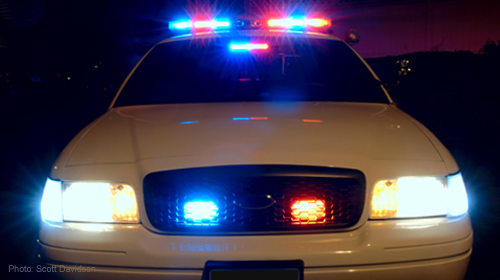
This piece was originally published on .
When I was 14, my grandfather sat me down for "the talk" – not the birds and the bees, but "the billy clubs and the bullets."
I brushed him off. I thought that in my majority-black hometown of Newark, racism would not reach me. Little did I realize that a healthy fear of the police would become a survival skill for a young black man.
My wake-up call came at 16.
As I noticed former friends slipping into the traps of my South Ward neighborhood, I was determined to be different. I joined debate club and the law academy, and played on the baseball team at University High School, and I never had run-ins with the police.
But walking home one evening down Hawthorne Avenue my junior year, I spotted a Crown Victoria with tinted windows creeping up behind me. Unsettled, I sped up, hoping to reach the safety of my house. Instead, my quickened pace prompted the car to cut in front of me. Two Newark Police Department officers emerged. One was black. The other was not. He had his gun drawn.
"Get on the wall," one yelled.
Terrified, with my arms up against the metal grate of Bragman's Deli, I asked, "What have I done, sir?"
"Where are you coming from?" an officer growled.
"Baseball practice," I answered as an officer looked through my book bag.
One officer chastised me for presenting a school ID instead of an "authentic" one, which I didn't have at 16. Finally, the cops told me to take a seat on the curb while they ran a check on my ID. For what seemed like an eternity, drivers passed and stared until the police finally let me go. Those slow moments were some of the most embarrassing, humiliating, and terrifying of my life.
Even with my grandparents' lessons in the unwritten rules of conduct awaiting me because of my inherited blackness, I was shocked to be subjected to unprovoked harassment by minority police officers. I now felt unsafe in my neighborhood, and not because of the killings, carjackings, and crime festering in my part of Newark. I felt scared because, for the first time in my life, I knew police abuse could happen to me, and I realized that I was lucky my encounter with police only robbed me of my dignity.
It's one thing to be scared of criminals. It's another thing entirely to be scared of the people who are supposed to protect you. My appearance branded me a menace, even though I hadn't done anything illegal. After being treated like a second-class citizen by the police, you start to believe you are one.
While I didn't have strong feelings about the police before I was wrongly stopped and frisked, being abused the way I was made me want to avoid any contact with cops. Why would a Newarker who suspects illegal activity go to the police when he lives in fear of those same officers every day? A community that doesn't trust the police is one where criminals can run amok, safe in knowing that the citizenry and police are at odds.
Abusive stop-and-frisk policies have no place in a democracy. As a kid, I faithfully believed that routine racial profiling would not happen to me the way it had to my grandfather. Now, seeing "the talk" through the lens of personal experience, I know better. I hope that one day, if I tell my own grandchildren about the dangers of interacting with police, they will be able to brush off my warnings because police abuse will have truly become a thing of the past.
My story is not an anomaly. The more of us who come forward to share what we've been through, the closer we'll get to having a powerful voice in shaping the Newark Police into a department that respects everyone's human rights, no matter what they look like.
Last night, the ŔĎ°ÄĂĹżŞ˝±˝áąű of New Jersey, together with labor, civil rights and community groups, launched Newark Communities for Accountable Policing, or N-CAP, a movement that will push for meaningful citizen participation in the coming reforms of the Newark Police Department. In particular, it has begun to push for the toughest civilian oversight of a police department in the country.
The launch of N-CAP, held at United Vailsburg Services Organization in Newark, featured five Newarkers each telling their own stories of personal encounters with police abuse. Michael Hobbs, the author of this post, shared his all-too-common story during this event.
Learn more about police practices and other civil liberty issues: Sign up for breaking news alerts,, and .

